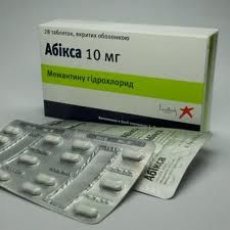Medical expert of the article
New publications
Preparations
Abixa
Last reviewed: 03.07.2025

All iLive content is medically reviewed or fact checked to ensure as much factual accuracy as possible.
We have strict sourcing guidelines and only link to reputable media sites, academic research institutions and, whenever possible, medically peer reviewed studies. Note that the numbers in parentheses ([1], [2], etc.) are clickable links to these studies.
If you feel that any of our content is inaccurate, out-of-date, or otherwise questionable, please select it and press Ctrl + Enter.

Indications Abixa
Abixa is intended for people suffering from various forms of dementia, including senile dementia of the Alzheimer's type.
Release form
Abixa is available in the form of film-coated tablets with a strip for dividing on both sides, ten milligrams each, No. 28, No. 56. The active substance is memantine.
 [ 1 ]
[ 1 ]
Pharmacodynamics
The drug Abiksa has a neuroprotective, antispasmodic and antiparkinsonian effect. The active substance of the drug is an antagonist of glutamate N-methyl-D-aspartate receptors, dulls glutamatergic neurotransmission and the development of neurodegenerative phenomena, has a neuromodulatory effect. The drug has a positive effect on psychoactivity, helps improve memory, concentration, corrects movement disorders.
Pharmacokinetics
After oral administration, the drug is quickly and completely absorbed, the maximum concentration in the blood is achieved within two to six hours. Excretion occurs in two stages: T 1/2 is four to nine hours in the 1st phase, forty to sixty-five hours in the 2nd. Eliminated mainly by the kidneys (seventy-five to ninety percent). With normal kidney function, accumulation in the body does not occur.
Dosing and administration
The method of administration and dosage of the drug Abixa for adults at the initial stage is half a tablet per day (five milligrams) in the morning for seven days. During the next week, one tablet per day (ten milligrams) is prescribed - half a tablet twice a day. From the third week, the drug is taken in a dosage of fifteen milligrams per day - one tablet in the morning and half a tablet after lunch. In the fourth week, the recommended dose is twenty milligrams per day (twice one tablet). In order to minimize the occurrence of adverse reactions, the dosage is increased by five milligrams per seven days during the first three weeks.
Food intake does not affect the effect of the drug. For patients over sixty-five years of age, the recommended dosage is twenty milligrams per day (two tablets). For patients with moderate renal impairment, the dosage does not change. In case of moderate renal impairment, the daily dosage is ten milligrams. There are no data on the use of the drug in patients with severe renal impairment, as well as in children and adolescents.
 [ 9 ]
[ 9 ]
Use Abixa during pregnancy
The use of Abix during pregnancy is not recommended, except in cases of extreme necessity. Animal experiments suggest that the use of the drug can slow intrauterine growth at levels of influence equivalent to or slightly greater than in humans. The potential risk to humans has not been established.
Contraindications
Contraindications to the use of Abix include hypersensitivity to memantine or any component of the drug, severe renal dysfunction. It is prescribed with caution to patients suffering from epilepsy, as well as patients with a history of seizures. The drug can affect human reactions, so when using it, it is not recommended to drive or operate equipment.
Side effects Abixa
Possible side effects of Abix:
- Feeling of anxiety;
- Damage to any organ or part of the body;
- Spontaneous emptying of the bladder;
- Diarrhea;
- Sleep disorders (insomnia);
- Dizziness and headache;
- Hallucinations;
- Constipation;
- Cough;
- Falls.
Overdose
An overdose of the drug Abixa may lead to visual hallucinations, loss of consciousness, development of stupor, and also cause a feeling of anxiety, psychosis, drowsiness. In cases of drug overdose, symptomatic therapy is carried out.
 [ 10 ]
[ 10 ]
Interactions with other drugs
Interactions of Abix with other drugs: Abixa should not be used simultaneously with N-methyl-D-aspartate antagonists. Simultaneous administration of Abixa with antispasmodics may affect the action of memantine, which in turn may require dosage adjustment. When Abixa is used simultaneously with drugs containing hydrochlorothiazide, its concentration in the blood may decrease.
Storage conditions
The drug Abixa does not require special storage conditions.
Attention!
To simplify the perception of information, this instruction for use of the drug "Abixa" translated and presented in a special form on the basis of the official instructions for medical use of the drug. Before use read the annotation that came directly to medicines.
Description provided for informational purposes and is not a guide to self-healing. The need for this drug, the purpose of the treatment regimen, methods and dose of the drug is determined solely by the attending physician. Self-medication is dangerous for your health.

